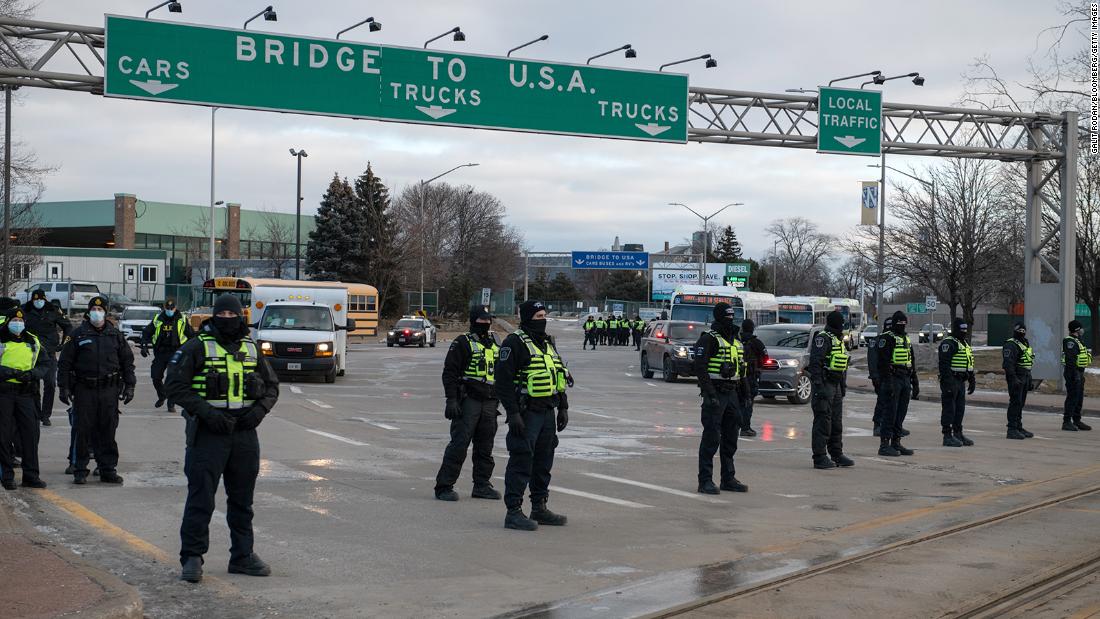These are the effects in the US of the truckers' strike in Canada 2:17
New York (CNN Business) --
America's biggest trading partner isn't China or Mexico.
It's Canada.
And the Ambassador Bridge, which separates the United States from its neighbor to the north, may be the most economically important 1.60-kilometer highway in the Western Hemisphere.
Until last week it received very little attention for the crucial role it plays in the economies of the two countries.
A total of $664 billion worth of goods moved between the two countries last year, according to data from the US Department of Commerce. The state of Michigan estimates that 30% of the total moved over the privately owned Ambassador Bridge. linking Detroit and Windsor, Ontario.
It is estimated that 10,000 commercial vehicles cross the bridge daily.
But not this last week.
This is how the protest of truckers in Canada is experienced from the inside 4:53
Protesters angry over vaccine mandates in Canada essentially closed the bridge starting Monday night and stopped the flow of goods over the bridge by blocking ramps on the Canadian side.
Business groups sounded alarm bells about the massive costs caused by the closure, but police did not move to clear the bridge and arrest protesters until Saturday morning.
advertising
As of Sunday morning, the bridge was still essentially locked down.
Canadian police reported that arrests are being made and vehicles are being towed, and urged the public to stay away.
Authorities are taking steps to prevent future blockades and hope to have the bridge open by Sunday afternoon.
The fact is that the economies of Canada and the United States are closely intertwined in ways that citizens of both are unlikely to realize or take for granted.
Since goods generally cross the border with limited tariffs or other taxes, factories on one side of the border rely on suppliers on the other.
Experts say there isn't a car built in the United States without Canadian parts, and vice versa.
Trucking strike in Canada affects the United States
While Canada does not have its own locally owned auto industry, it is home to plants for most of the world's major automakers serving North America, including General Motors, Ford, owner Chrysler, Stellantis, Toyota, and Honda.
In 2021, the United States imported more than one million complete vehicles from Canada, worth approximately $25 billion.
Canada, with about one-ninth the population of the United States, imported 750,000 American vehicles, worth about $14 billion in the same period, according to data from research firm IHS Markit.
"Essentially, automotive supply chains treat that border like it's a state border," said Bernard Swiecki, director of research at the Center for Automotive Research, a Michigan think tank.
"Financially speaking, that international border may as well not be there."
Canada and Mexico interpret the rules in the automotive industry differently from the US, says Tatiana Clouthier before the summit
Difficulties moving goods between countries this week have produced a host of economic problems, and not just in Michigan, where workers this week lost an estimated $51 million in wages due to the lockdown, or in Windsor, Ontario, considered the Detroit of Canada.
Factories as far away as Toyota plants in West Virginia, Kentucky and Alabama, as well as a Ford plant that produces Super Duty trucks in the Cleveland suburb of Avon Lake, Ohio, have been forced to temporarily stop or scale back operations.
So did a plant in the Toronto suburb of Brampton, Ontario, which makes Chrysler 300s, Dodge Chargers and Dodge Challengers.
The Great Lakes that separate the eastern United States and Canada limit the number of places where it is possible to cross the land border between the eastern part of the two nations.
While there is a tunnel between Detroit and Windsor, it is generally closed to commercial traffic because it does not have the customs facilities that the bridge does.
Another bridge links Port Huron, Michigan, and Sarnia, Ontario, but the route involves a 150-mile detour and has seen its own share of protests this week, making it risky for trucks to try to cross the border there.
Blockades of truckers continue on the border with Canada
Protest blockades in Canada
Rising 152 feet above the Detroit River, the 92-year-old Ambassador Bridge is only two lanes wide in any direction.
An alternative bridge is being built about a kilometer away, but will not open for at least two more years.
It will have three lanes in each direction and will be named after Gordie Howe, the Canadian-born hockey superstar who played for the Detroit Red Wings.
While the auto industry received the most attention this week due to the industry's concentration in Detroit and Windsor, it's not the only industry dependent on the bridge.
"A lot of production, a lot of products depend on the bridge. It's not just cars," said Stephanie Brinley, principal analyst at IHS Markit.
Supply Chain Crisis: Even Your Neighborhood Grocery Store Is Struggling With Shortages
Brinley said the closures come at a bad time for the automaker and other manufacturers.
Global supply chain problems have caused widespread delays and shortages and increased prices for parts and raw materials, forcing many to cut production.
All major automakers have had periods over the past year when they have been forced to temporarily close factories or cut production, as have some manufacturers in other industries.
Those factors have been a major factor in driving US prices up at the fastest rate in nearly 40 years.
While the week-long closure of the Ambassador Bridge alone is unlikely to affect car prices for consumers, it has raised costs for automakers who have had to pay more to ship goods by air.
"Our supply chain is pretty fragile right now," Brinley said.
"We don't need another problem in the works."
CNN's Miguel Marquez contributed to this report.
TradeEconomyUnited States


/cloudfront-eu-central-1.images.arcpublishing.com/prisa/PCE7NMB26ZDVRIQX2R26JSNH6A.jpg)









